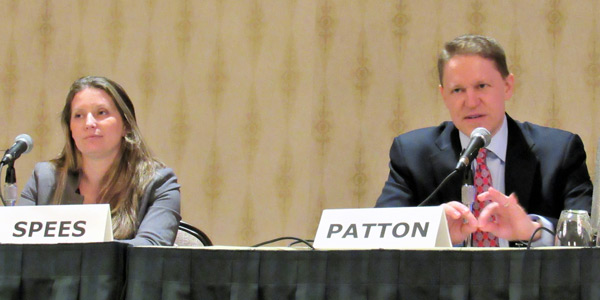By Amanda Durish Cook
NEW ORLEANS — Two consultants on either side of MISO’s rejected capacity auction redesign faced off in a post-mortem debate at the Gulf Coast Power Association’s MISO South Regional Conference last week.
Kathleen Spees, a principal adviser at The Brattle Group who endorsed MISO’s forward auction design for the RTO’s retail-choice areas and worked on a simulation analysis for the RTO, said some of MISO’s design elements could be revised to win FERC approval. But Independent Market Monitor David Patton pressed for a reconsideration of the hybrid prompt proposal he designed with the RTO last year.
The rejected auction proposal was an attempt to provide investment price signals to incent generation in retail choice areas in southern Illinois and Michigan. (See FERC Rejects MISO’s 3-Year Forward Auction Proposal.)
Spees, who joked that she and Patton should have come dressed as Hillary Clinton and Donald Trump for the debate, said FERC’s unusually short order lacked commission guidance on how MISO’s proposal could be salvaged. The order was among more than 60 the commission issued in the last week before losing its quorum with the resignation of former Chairman Norman Bay.
“I think that leaves many of us scratching our heads about what to do next,” Spees said at the Feb. 16 conference. She said she thought a compromise could be reached over how far into the future the auction is held and suggested that, in a new proposal, MISO keep a sloped demand curve for its retail-choice areas while regulated utilities maintain vertically integrated statuses.
Patton said MISO “dodged a bullet” with the rejection. “You operate the system as a whole. You can’t pretend that 10% of your footprint operates separately,” he said.
The Monitor continued to advocate for his own proposal, which would apply a sloped demand curve to deregulated areas and produce separate clearing prices for retail-choice and regulated load.
Spees said MISO’s proposal failed because it did not maintain an integrated market or contain a transmission allocation plan between two markets. “MISO has a uniquely challenging situation where there are two business models in conflict,” she said. There is “a not-so-small-it-can’t-be-ignored portion of the system that relies on market signals.”
Patton said current rules only buoy regulated utilities, which continue to expand generation even when wholesale prices don’t support construction.
“We exist in an environment where only a regulated market can afford to build anything,” he said. “We’ve designed a capacity market in MISO that doesn’t set efficient prices; it sets inefficiently low prices, especially in MISO South.”
Patton said while he monitors both prompt and forward markets, he prefers a prompt design. He said while it’s “nifty” for future resources to be able to sell capacity, an owner of a plant with a 30-year lifespan won’t usually make decisions on the viability of their generation based on clearing prices in year one.
Spees, however, said a three-year forward auction provides more of an opportunity for supply and demand to reach equilibrium and avoid “boom and bust” cycles with volatile clearing prices. However, she said accurate load forecasting in a three-year market presents a challenge. “In my view, we’ve seen both prompt and forward markets do well…They both can be workable constructs,” she said.
The two were in agreement in opposing MISO’s adoption of New England’s Pay-for-Performance capacity bonuses and penalties. PJM adopted similar rules in its Capacity Performance construct. Patton said he preferred incentives to stay in the energy market. (See FERC Defends PJM Capacity Performance Model Before DC Circuit.)
“If it ever hits on days where no one is expecting it, it can cost people a heck of a lot of money,” Patton said, adding that unpredictable load is not the fault of the generator.
Spees also said performance incentives belong in the energy market, not the capacity market. However, she said there is no MISO enforcement for capacity underperformance, and she said the penalty should be “something north” of $0/MW-day.





